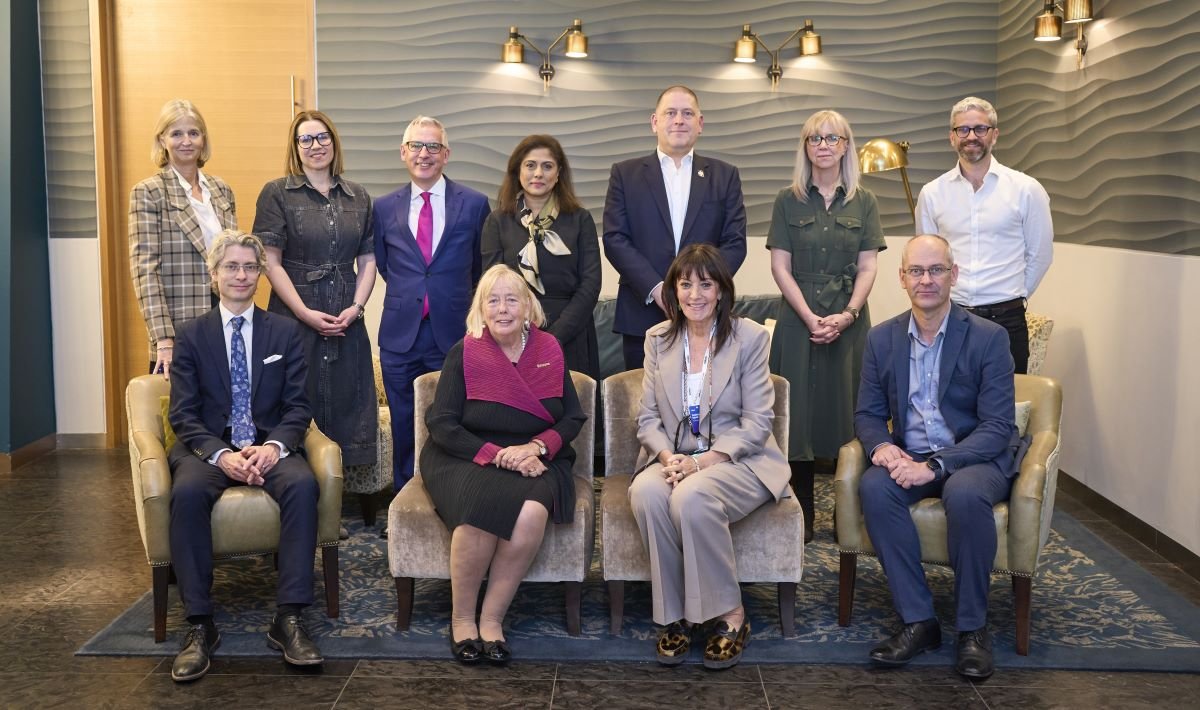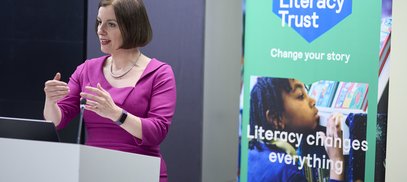Leaders from across the private, public and third sectors gathered in London on Wednesday 2nd April 2025 to celebrate and reflect on the tenth anniversary of the Vision for Literacy Business Pledge, co-founded in 2015 by the UK’s leading literacy charity, the National Literacy Trust, and KPMG UK.
Over the past ten years, the Vision for Literacy Business Pledge, has galvanised the business community to take action and put literacy at the heart of their responsible business agenda to help break down barriers to opportunity and close the literacy gap between children and young people living in the most disadvantaged communities in the UK and their more affluent peers.
110 businesses have so far signed the pledge and are driving change by engaging their customers, partners and suppliers to help children and young people across the UK build literacy skills needed to thrive. Businesses are using their internal networks to raise awareness and funds for UK literacy programmes and leveraging their voice and local influence to help raise awareness of the importance of literacy and make it a national priority for politicians, businesses and families alike.
Why does this matter?
Having low literacy levels risks social and economic exclusion, yet many children in the UK lack essential reading, writing, and oracy skills. Those who fall behind by age five, face lifelong challenges, earning £5,300 less on average and costing the government £2,500 more in support. Poor literacy is also linked to health inequalities, higher crime rates, and reduced social mobility.
The National Literacy Trust’s latest research shows reading enjoyment among 8- to 18-year-olds has dropped to its lowest level since 2005 with enjoyment of reading at crisis point. 2 in 3 children and young people don’t enjoy reading.
Twice as many children and young people who enjoy reading in their free time have above average reading skills than children who don’t enjoy it (34.2% vs 15.7%). This finding is important at a time when children and young people’s reading skills are cause for concern, particularly for those from disadvantaged communities; last year, a third (35%) of 16-year-olds failed to achieve good GCSEs in English language and maths, rising to more than half (56.7%) of those from disadvantaged communities [1].
Among the broader benefits unveiled in the research, children and young people who read in their free time at least once a month said it helps them to relax (56.6%) and feel happy (41%), learn new things (50.9%), understand the views of others (32.8%), learn about other cultures (32.4%) and be confident (26.0%).
Previous research by WPI Strategy for the National Literacy Trust and British Land also outlined the benefits of reading for pleasure for the UK economy. It found that, if all school-aged children in the UK read for pleasure every day, the number getting five good GCSEs by the age of 16 could increase by 1.1 million within 30 years, boosting their average lifetime earning potential by £57,500 and adding £4.6 billion to the UK’s GDP each year.
A survey of business leaders conducted by the National Literacy Trust demonstrated concerns about the literacy gap. 9 in 10 businesses were concerned about young people’s levels of literacy in the workplace and 1 in 5 business leaders said poor literacy skills were a significant problem for their business.
Given the substantial societal and economic impacts of the UK’s literacy challenge, the Vision for Literacy Business Pledge brings the business community together with charities, schools and the government to prioritise literacy and improve the literacy skills of children and young people who need it most.
Education Secretary, Bridget Phillipson, who was present at the anniversary event, said:
“A strong foundation in reading and writing is crucial for children and young people to achieve and thrive, breaking the link between background and opportunity. Literacy unlocks new worlds and the rest of children’s learning, with pupils who are supported to read well achieving in their other subjects too. Driving high and rising standards is at the heart of our Plan for Change, and ensuring pupils have strong literacy skills is a key part of that. Government, schools, businesses, families and communities must work together to create an environment where reading for pleasure is actively encouraged.”
Bridget Phillipson
“Tackling the UK’s literacy gap is crucial to ensuring every child, regardless of their background, can thrive in education, work, and society. With children and young people’s enjoyment of reading at an all-time low, and high numbers leaving primary and secondary school without the reading skills they need to thrive, the futures of a generation are being put at risk. It is essential that we turn the page on the reading for pleasure crisis and work in multi-sector partnership with business, schools and government, amplifying our collective reach and influence, strengthening our impact and re-imagining solutions to this complex crisis.”
Jonathan Douglas CBE, Chief Executive of the National Literacy Trust

“Literacy is more than just an academic requirement. Mastering skills such as reading, writing, and comprehension gives young people the foundation and confidence they need to thrive. By supporting the pledge, businesses will help improve social mobility in their communities, as well as investing in the future workforce. We all want to create the right conditions for a fairer society with well-prepared young people who are ready for the modern workplace, which is why this pledge is so important.”
Catherine Burnet, UK Head of Audit and Partner Sponsor for Opening Doors to Opportunities, KPMG UK
[1]. Department for Education and Ofqual statistics show that, in the 2023/24 academic year:
- 26% of 11-year-olds in England left primary school without the reading skills expected for their age, rising to 38% of pupils eligible for free school meals [Key stage 2 attainment data]
- 35% of 16-year-olds did not achieve a grade 4 or above in English language and maths GCSE, rising to 56.7% for pupils eligible for free school meals [GCSE outcomes in England]
